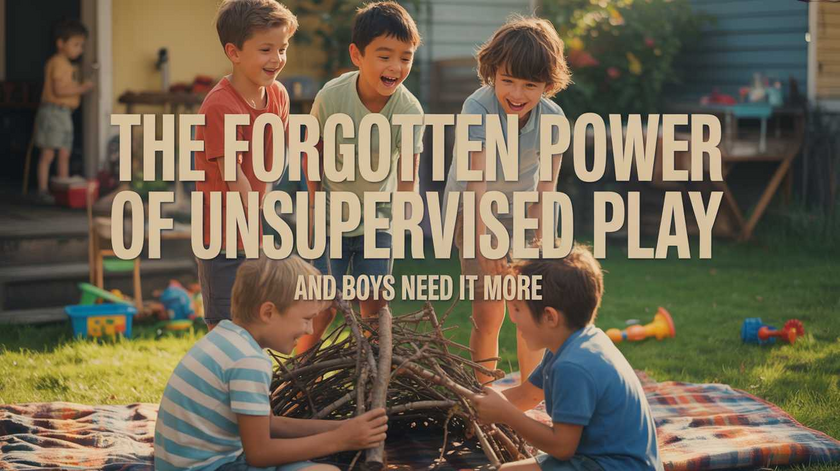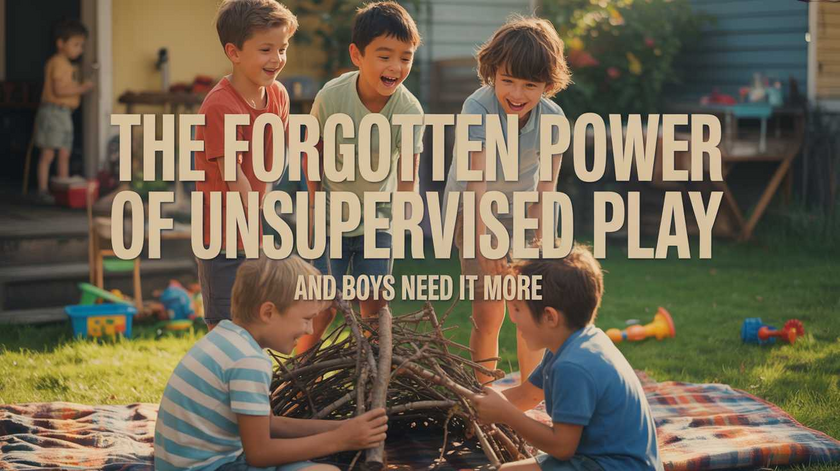The Forgotten Power of Unsupervised Play
Why Every Child Needs It—and Why Boys May Need It Even More
Not long ago, kids roamed the neighborhood on bikes, made forts out of sticks, got dirty, got in arguments, and figured out how to make up. These weren’t activities we scheduled. They just happened. Today, that kind of spontaneous, unsupervised play is vanishing—and with it, something essential to childhood is being lost.
There’s been a quiet but powerful shift over the past few decades: adults now manage more and more of children’s lives. We organize their time, structure their activities, and hover over their every move, convinced that doing so will make them safer, smarter, and better prepared for life. But what if the opposite is true? What if removing unsupervised play is actually stunting their development?
What Is Unsupervised Play?
Unsupervised play doesn’t mean unsafe play. It means play that isn’t micromanaged. It’s when children make the rules, solve the problems, and decide what the game is. It can be solo or with peers. Sometimes adults are nearby in case of emergency—but they’re not directing the action. This kind of play is a natural, evolutionary part of how kids grow into capable adults. And today, it’s in short supply.
Research backs up what many of us have long sensed: unsupervised play is essential to healthy childhood development across emotional, social, physical, and even moral domains. And here’s the added layer that often gets ignored—boys may suffer the most when this kind of play disappears.
Building Independence and Confidence
When children aren’t being constantly told what to do, they learn something powerful: “I can figure this out.” That lesson builds confidence. They try something new, and maybe it works, maybe it doesn’t. But it’s their decision. Over time, this builds independence—an internal compass that tells them they don’t always need someone else to approve or decide for them.
For boys, this kind of autonomy is especially critical. Boys often learn by doing, not by being told. Unsupervised play lets them test, fail, adjust, and master challenges on their own terms. Take that away, and they’re left with a life of instruction and correction, where adult voices drown out their own inner development.
Dr. Kenneth Ginsburg from the American Academy of Pediatrics has emphasized that free play builds resilience and decision-making skills—especially important for children developing their sense of agency. Boys, who are often more sensitive to control than we realize, benefit enormously from this space to lead themselves.
Imagination and Creativity Take Root
Watch kids in free play and you’ll see a burst of creativity. Sticks become swords or magic wands. A pile of blankets becomes a secret base. They’re not limited by adult ideas of “how it should go.” In fact, adults often get in the way.
Girls may gravitate toward collaborative storytelling or nurturing role-play, while boys are more likely to invent rule-based games, fantasy scenarios, or rougher adventures. Both types of play are essential. But boys in particular benefit from this rule-making process—they’re not just playing a game, they’re creating social order and testing fairness, leadership, and strategy.
Studies by Sandra Russ show that unstructured pretend play fuels divergent thinking—the kind of thinking that leads to problem-solving, invention, and art. For boys especially, who may not always shine in traditional classroom settings, free play offers a creative outlet that aligns with their natural interests and strengths.
Social Skills Without a Script
We often hear about how kids need to learn to “work well with others.” But how do they actually learn that? Not through lectures. Not through adult-facilitated “sharing time.” They learn it by being with other kids—without an adult immediately jumping in.
In unsupervised play, children naturally encounter disagreements. Someone wants to change the rules. Someone doesn’t want to play anymore. Someone gets hurt feelings. And they work it out. Or they don’t—and learn from that too.
For boys, this kind of organic negotiation is often more developmentally effective than verbal instruction. Boys are less likely than girls to engage in emotional check-ins or group conversations. But they do sort out status, fairness, and inclusion through physical and active play—what some researchers call “rough-and-tumble diplomacy.”
When adults interrupt or manage these processes too closely, boys miss critical opportunities to practice leadership, cooperation, and empathy in their own style. Over time, they may come to believe that their instincts are wrong—or worse, that they’re simply bad at relationships.
Learning to Handle Risk and Judgement
Children need to experience healthy risk. Climbing a tree or balancing on a log teaches them something that flashcards can’t: how to assess danger, how to listen to their bodies, how to push limits wisely.
Modern parenting often sees risk as the enemy. But eliminating all risk also eliminates the chance for growth. Studies by Mariana Brussoni and others have found that riskier outdoor play is associated with better physical health, improved confidence, and even lower injury rates over time—because kids learn to evaluate risk on their own.
And here again, boys are disproportionately affected by risk-averse environments. They are biologically more inclined toward high-energy, adventurous play. This isn’t a defect—it’s a design. Rough-and-tumble activity isn’t aggression; it’s exploration, boundary testing, and relational learning.
When we suppress boys’ access to this kind of play, we don’t reduce aggression—we remove a key mechanism for learning how to channel and regulate it.
Ownership, Accountability, and Consequences
When kids direct their own play, they also learn that their choices have consequences. If they leave toys out and it rains, those toys get ruined. If they make up a game that nobody else enjoys, they lose players. That’s the real world in miniature.
Adult-managed play often shields children from consequences. We clean up, we fix, we redirect. It might be well-intended, but it can rob children of the chance to learn responsibility in a natural, non-punitive way.
For boys—who often respond more strongly to hands-on learning—this kind of consequence-based development is vital. They learn best by experiencing the outcome, not just being warned about it.
Emotional Regulation and Expression
Unsupervised play also gives children the space to express themselves emotionally—without being corrected or redirected. A child who stomps off in frustration might, five minutes later, come back with a new idea. That’s emotional processing in action. No adult needed.
This is especially important for boys, who are often discouraged from expressing vulnerable emotions outright. In play, they can express frustration, anger, mastery, joy, or failure in ways that feel safe and embodied.
Therapists like Dr. Garry Landreth and researchers like Michael Gurian have shown how boys tend to process emotion kinetically—through movement, role-play, and active trial-and-error. In highly managed, verbal environments, these outlets dry up—and emotional development suffers.
A Word of Caution on Over-Supervision
Today’s children are often supervised to the point of surveillance. Playdates are scheduled, adults are ever-present, and rules are pre-written. Even well-meaning interventions—like constant praise, correction, or encouragement—can crowd out a child’s internal voice.
Peter Gray, an evolutionary psychologist, has warned for years that the decline of independent play is linked to rising rates of anxiety, depression, and learned helplessness among children and teens. And again, boys show these effects earlier and more acutely, often being over-diagnosed with ADHD, conduct disorders, or defiance—conditions that may actually be adaptive responses to unnatural environments.
Boys aren’t broken. But they’re often misunderstood. When the systems we place them in suppress movement, creativity, risk-taking, and autonomy, we shouldn’t be surprised when they rebel—or shut down.
Bringing It Back
We can bring back unsupervised play. It starts with letting go of the idea that kids must always be occupied, guided, or entertained. It means allowing a little boredom, a little mess, and a few scrapes. It means trusting that play is not a waste of time—but a form of learning that’s just as vital as reading or math.
Let the backyard become a jungle. Let the basement become a spaceship. Let the kids make the rules—even if they’re strange, inconsistent, or fall apart halfway through.
Unsupervised play isn’t about being reckless. It’s about trusting childhood. It’s about recognizing that the best kind of growth often happens when adults step back—not in neglect, but in respect for the child’s ability to figure things out.
And if we want to raise boys who are confident, connected, and emotionally resilient, then we need to stop managing their play—and start protecting it.
References
Brussoni, M., Gibbons, R., Gray, C., Ishikawa, T., Sandseter, E. B. H., Bienenstock, A., ... & Tremblay, M. S. (2015). What is the relationship between risky outdoor play and health in children? International Journal of Environmental Research and Public Health, 12(6), 6423-6454.
Ginsburg, K. R. (2007). The importance of play in promoting healthy child development and maintaining strong parent-child bonds. Pediatrics, 119(1), 182–191.
Gray, P. (2011). The decline of play and the rise of psychopathology in children and adolescents. American Journal of Play, 3(4), 443–463.
Gurian, M. (2010). The Wonder of Boys: What Parents, Mentors and Educators Can Do to Shape Boys into Exceptional Men. TarcherPerigee.
Landreth, G. L. (2012). Play Therapy: The Art of the Relationship (3rd ed.). Routledge.
Pellegrini, A. D., & Smith, P. K. (1998). Physical activity play: The nature and function of a neglected aspect of play. Child Development, 69(3), 577–598.
Russ, S. W., & Wallace, C. E. (2013). Pretend play and creative processes. American Journal of Play, 6(1), 136–148.
Yogman, M., Garner, A., Hutchinson, J., Hirsh-Pasek, K., & Golinkoff, R. M. (2018). The power of play: A pediatric role in enhancing development in young children. Pediatrics, 142(3), e20182058.




















